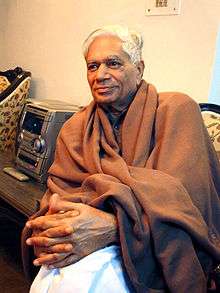Lokesh Chandra
| Lokesh Chandra | |
|---|---|
 | |
| Born |
11 April 1927 Ambala, Haryana, India |
| Nationality | Indian |
| Education | M.A., 1947, Ph.D., 1950 |
| Occupation | Scholar |
| Title | President, ICCR[1] |
Prof. Lokesh Chandra (born 1927) is a prominent scholar of the Vedic period, Buddhism and the Indian arts. Presently he is the president of Indian Council for Cultural Relations.[2] He is also the Director of the International Academy of Indian Culture. He has also served as a member of the Indian Rajya Sabha, Vice-President of the Indian Council for Cultural Relations, and Chairman of the Indian Council of Historical Research.[3]
In 2006 he was recognized with India's Padma Bhushan award.[4]
He is the son of the famous Sanskrit scholar, linguist and politician Raghu Vira.
After obtaining a master's degree at the University of the Punjab in Lahore in 1947, he edited the Gavamayana portion of the Vedic work Jaiminiya Brahmana with the help of newly discovered manuscripts. Chandra went to the Netherlands to study Old Javanese with the Indologist Jan Gonda at Utrecht University, where he obtained a Ph.D. with the dissertation Jaiminiya Brahmana of the Samaveda II.1-80 in March 1950[5][6]
Prof. Lokesh Chandra has studied many languages including English, Hindi, Sanskrit, Bengali, Pali, Avesta, Old Persian, Japanese, Chinese, Tibetan, Malayalam, Mongolian, Indonesian, Greek, Latin, German, French, Tamil, Old Javanese, and Russian.[7]
He has to his credit over 360 works and text editions.[8] Among them are classics like his Tibetan-Sanskrit Dictionary, Materials for a History of Tibetan Literature, Buddhist Iconography of Tibet, and his Dictionary of Buddhist Art in about 20 volumes.[9]
Publications
Books
- Buddhist Iconography
- India's Contributions to World Thought and Culture
- Transcendental Art of Tibet
- Mudras in Japan
- Cultural Horizons of India
- Dictionary of Buddhist Iconography in 15 volumes.
- With Raghu Vira, Gilgit Buddhist Manuscripts. Facsimile edition. New Delhi: International Academy of Indian Culture, 1959-74.
Articles
- Lokesh Chandra (1984). "The Origin of Avalokitesvara" (PDF). Indologica Taurinenaia. International Association of Sanskrit Studies. XIII (1985-1986): 187–202. Retrieved 26 July 2014.
Sources
- Bio Data of Prof. Lokesh Ckandra — at Sanchi University if Buddhist—Indic Studies.
- An Essay from Indira Kalakendra
- THE GULF WAR Hinduism Today — March 1991
References
- ↑ http://iccr.gov.in
- ↑ http://mea.gov.in/press-releases.htm?dtl/24157/Prof+Lokesh+Chandra+appointed+as+the+17th+President+of+Indian+Council+for+Cultural+Relations
- ↑ http://14.141.36.212/hj/iccr_qc/content/bio-profile-prof-lokesh-chandra-president-iccr
- ↑ "Padma Bhushan Awardees". archive.india.gov.in. Government of India. Retrieved 26 July 2014.
- ↑ http://www.sanchiuniv.org.in/pdf/Lokesh%20Chandra%20CV.pdf
- ↑ Bijzondere promotie in Utrecht ("Special promotion in Utrecht"), Utrecht Nieuwsblad, 4 March 1950 (with a picture)
- ↑ "Lokesh Chandra New ICCR President". Outlook. 30 October 2014. Retrieved 27 December 2015.
- ↑ "Bio Data of Prof. Lokesh Ckandra" (PDF). Sanchi University if Buddhist—Indic Studies. Retrieved 26 July 2014.
- ↑ http://14.141.36.212/hj/iccr_qc/content/bio-profile-prof-lokesh-chandra-president-iccr
External links
- Lokesh Chandra, Yashaswini Chandra. Buddhist iconography: Dr. Lokesh Chandra in conversation with Dr. Yashaswini Chandra (Video).